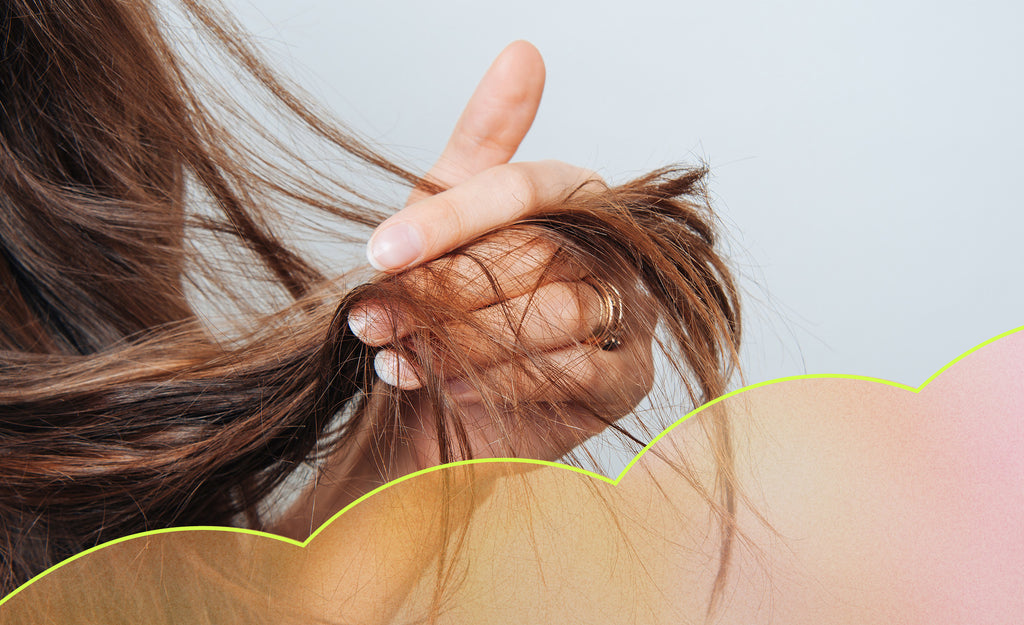This content was created by Girlboss in partnership with Nutrafol.
Jada Pinkett Smith, Viola Davis, Selma Blair, Tyra Banks, Naomi Cambell, Lea Michele: just some of the famous women who have spoken openly about their experience with hair thinning. It’s actually quite common. According to a study by Harvard Medical School, two-thirds of women will experience hair thinning in their lifetime. The reasons vary: hormone imbalance, childbirth, aging… and yes, even stress.
So, how does stress actually lead to hair thinning? Basically, if you experience stress for a long enough period of time, your body will produce hormones that gradually decrease your blood sugar levels which have been linked to hair thinning, according to Afope Atoyebi, a certified trichologist (read: hair and scalp specialist) who provides haircare education to her 55K subscribers on YouTube. Stress-related hair issues are more of a general thinning from the entire scalp, rather than a specific area—and happens from feeling consistently burned out or experiencing a traumatic event (so, a nerve-wracking one-on-one with your boss isn’t enough to affect your hair cuticles, don’t worry).
“The body prematurely pushes hairs that are in their growing phase into the resting (pre-shedding) phase,” explains Atoyebi. “This phase in the hair growth cycle typically lasts about three months before the hair begins to shed naturally, so this is why patients will typically notice this hair thinning about three months following a stressful event or time period.”
We chatted with Atoyebi about how to manage stress-related hair thinning, the biggest misconception about it and why there’s still such a stigma.
What are some ways to help manage/prevent stress-related hair thinning?
There are the obvious de-stressors like spending time with loved ones, having a self-care day, getting enough sleep, eating well and seeing a therapist. “All of these are great ideas but are also temporary escapes when used in isolation,” says Atoyebi.
If you’re looking for more of a long-term solution, Nutrafol’s drug-free, dermatologist-recommended products are clinically proven to improve hair growth. Their star hair growth nutraceutical is a daily supplement that delivers faster-growing, visibly thicker, fuller, stronger hair in three to six months. The numbers speak for themselves: 90 percent of women saw improved hair overall, 86 percent saw better hair growth and 84 percent saw less shedding after six months.
Nutrafol also carries hair wellness boosters that provide extra support for specific needs like stress, nutrition, aging, metabolism and more.
Why is there still such a stigma surrounding hair thinning in women?
“Hair has always been more than just hair,” says Atoyebi. “In many cultures, what a woman’s hair looks can be indicative of everything from her heritage to her health, and even her political views. When women lose their hair, it’s rarely ever by choice or intention, and the lack of control over something that says so much about you is scary. This fear is compounded by the fact that many of us know little-to-nothing about hair thinning until we experience it ourselves.”
What is the biggest myth around stress-related hair thinning in women you want to debunk?
“That all of your hair will fall out,” says Atoyebi. “Experiencing hair thinning itself is stress-inducing, but you have to focus on being patient and kinder to yourself without fearing you are running short on time or solutions, which will only prolong the healing process.”
Learn more about the clinically-proven, dermatologist-recommended, 100% drug-free products from Nutrafol here.



